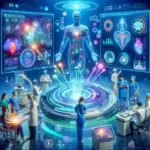Exploring the Exponential Growth of AI in Healthcare
The integration of Artificial Intelligence (AI) in healthcare is set to revolutionize the industry, with projections estimating the market will reach an astonishing $613.81 billion by 2034. This phenomenal growth holds immense potential to enhance patient care, streamline operations, and improve overall healthcare outcomes. Let’s delve into the key factors driving this surge and what the future holds for AI in healthcare.
The Driving Forces Behind AI’s Market Expansion
Several factors contribute to the explosive growth of AI in the healthcare sector:
- Increasing Demand for Personalized Medicine: The rising interest in personalized treatment plans tailored to individual genetic makeups is driving AI innovation, enabling more precise and effective therapies.
- Advancements in Data Analytics: AI’s capability to analyze enormous datasets quickly and accurately allows healthcare professionals to derive meaningful insights, aiding in faster diagnosis and treatment decision-making.
- Cost Efficiency: Implementing AI solutions can substantially reduce healthcare costs by automating administrative tasks, optimizing resource allocation, and minimizing errors.
- Enhanced Imaging and Diagnostics: AI supports the interpretation of medical images with greater accuracy, leading to early detection of diseases and improved patient outcomes.
- Growing Investment and Collaborations: A surge in funding and strategic partnerships between tech companies and healthcare institutions is accelerating AI research and application in the industry.
The Role of AI in Transforming Patient Care
Artificial Intelligence is set to transform patient care by providing innovative solutions across various healthcare functions:
- Remote Monitoring and Telemedicine: AI-powered devices enable continuous monitoring of patients, allowing timely interventions and reduced need for hospital visits.
- Surgical Robotics: AI-integrated robotic systems enhance surgical precision, reducing recovery times and improving overall patient outcomes.
- Predictive Analytics: AI can predict patient conditions before they manifest, assisting in preventive healthcare measures and reducing the incidence of chronic diseases.
- Virtual Health Assistants: AI-powered assistants provide 24/7 support to patients, offering personalized health advice and reminders for medication, thus enhancing patient engagement.
- Drug Discovery and Development: AI accelerates the process of drug discovery by identifying potential candidates faster, thereby saving time and reducing costs in bringing new drugs to market.
Challenges and Considerations
While the benefits of AI in healthcare are extensive, it also comes with its set of challenges:
- Data Privacy and Security: The vast amounts of sensitive data processed by AI necessitate stringent security measures to protect patient confidentiality.
- Regulatory Compliance: Navigating the complex regulatory landscape requires continuous updates and adherence to compliance standards, which can be resource-intensive.
- Ethical Concerns: The ethical implications of AI decision-making in life-and-death situations remain a critical discussion point, requiring a balance between technology and human oversight.
- Integration with Existing Systems: Healthcare facilities need to ensure seamless integration of AI technologies with current systems, which can pose technical and financial challenges.
- Workforce Training: Upskilling healthcare professionals to utilize AI tools effectively is essential for maximizing its benefits and ensuring patient safety.
Future Outlook: AI’s Transformative Impact on Healthcare
As AI technology continues to evolve, its future in healthcare looks promising:
- Integration with IoT: The combination of AI and the Internet of Things (IoT) is expected to create a more connected healthcare ecosystem, facilitating real-time health monitoring and data sharing.
- Predictive Healthcare Systems: By leveraging AI’s predictive capabilities, healthcare systems can shift towards a more preventive approach, reducing hospital admissions and focusing on maintaining patient health.
- Democratization of Healthcare: AI has the potential to make quality healthcare more accessible to underserved populations by providing remote diagnostic and treatment options.
- Continuous Advancements in Genomics: AI will play a crucial role in advancing genomics by enabling more complex and rapid analysis, paving the way for breakthroughs in genetic-based therapies.
- Personalized Healthcare Platforms: The development of personalized healthcare platforms powered by AI will empower patients to take charge of their health, improving compliance and overall well-being.
In conclusion, the integration of Artificial Intelligence in healthcare represents a groundbreaking shift, promising to enhance service delivery, optimize operations, and ultimately improve patient care on a global scale. As we move towards 2034, all stakeholders in the healthcare industry must work collaboratively to harness AI’s full potential, addressing the challenges while embracing the opportunities that lie ahead.
With the AI in healthcare market poised for significant growth, the future of medicine stands at the cusp of a technological revolution that could redefine how we approach health and wellness for generations to come.








